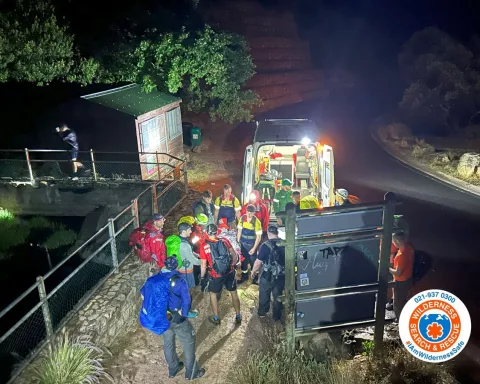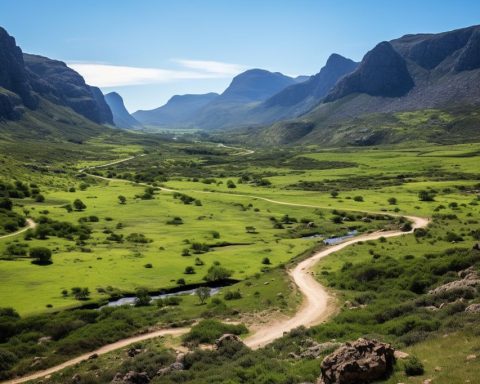Hiking in Cape Town’s beautiful wilderness is exciting, but it needs careful planning. To stay safe, start your hike early to avoid the hot sun, wear light clothes, and bring plenty of water—about 500ml for every hour. Remember the emergency number, 021 937 0300, just in case. While the stunning views from places like Lion’s Head call to adventurers, the heat can turn a fun outing into a risky situation, so respect nature and stay alert! Enjoy the beauty, but always be prepared!
What Should I Know Before Hiking in Cape Town’s Wilderness?
Before hiking in Cape Town’s wilderness, ensure you’re well-prepared:
– Start early to avoid peak sun hours.
– Choose shaded paths near water.
– Dress in light, loose clothing with UPF protection.
– Carry at least 500ml of water per hour.
– Know the emergency contact number (021 937 0300).
The Allure and Risks of Cape Town’s Majestic Landscapes
Cape Town’s stunning wilderness offers a magnetic pull for adventurers and nature enthusiasts alike. The city is surrounded by breathtaking landscapes that invite exploration. Yet, as captivating as these terrains may be, they demand both respect and vigilance, especially during the peak of summer. The intense heat can transform a picturesque hike into a dangerous endeavor. Wilderness Search and Rescue (WSAR) consistently emphasizes the importance of being prepared and cautious when hiking, particularly in extreme weather conditions. Recent events highlight the necessity of such caution, as a spate of incidents over a single weekend required the intervention of professional rescue teams and volunteers.
The mountains of Cape Town are an undeniable draw. Lion’s Head, renowned for offering panoramic views, attracts both locals and tourists. However, its beauty conceals a path that can become treacherous under the relentless rays of the sun. Over a recent weekend, the mountain served as a stark reminder of nature’s power. As temperatures soared, WSAR teams responded to multiple emergencies involving hikers who had been overwhelmed by the heat. A hiker on Lion’s Head required immediate medical assistance after collapsing, while a similar situation occurred at Elephant’s Eye, highlighting the unpredictable challenges of these adventures.
These incidents are not isolated. That same weekend, a hiker required evacuation from Kasteelspoort, a location famous for its scenic beauty but also its challenging trails. In a dramatic rescue, a Swiss hiker injured on the secluded Kouebokkeveld trail had to be airlifted, underscoring the fact that even experienced hikers are not immune to the whims of nature.
The Importance of Swift and Effective Rescue Operations
As dawn broke on Sunday, a rescue helicopter operated by the Western Cape Department of Health & Wellness, in conjunction with EMS, headed towards the Hex River Mountains. Here, a young hiker awaited assistance after suffering burn injuries. The rapid response and coordinated effort of the rescue teams illustrated their efficiency and commitment, even under challenging conditions.
Table Mountain, with its iconic silhouette, remains a favorite spot for hikers, but its trails can be deceptively complex. On Sunday afternoon, five local hikers found themselves disoriented near Maclear’s Beacon. WSAR experts guided them back to safety over the phone, demonstrating the critical role of clear communication and preparedness in ensuring safe outcomes in such situations.
David Nel, a representative of WSAR, shed light on the impact of the weekend’s heatwave, attributing at least half of the incidents to the oppressive temperatures. The South African Weather Service has forecasted an especially hot summer, heightening the need for vigilance. Nel’s insights serve as an essential reminder of the importance of preparation and adherence to safety protocols during outdoor activities.
Preparing for Safe Wilderness Adventures
In an effort to prevent such incidents, WSAR offers valuable guidance for those eager to explore nature’s splendor. Starting early is recommended to avoid the sun’s peak hours between 12 and 3 p.m. For those who do venture out, choosing shaded paths close to water sources can provide relief. Appropriate clothing also plays a crucial role; wearing light-colored, loose-fitting garments with UPF ratings can reduce sun exposure, while sunblock and hats offer added protection.
Staying hydrated is a fundamental aspect of any outdoor venture. Nel advises carrying at least 500ml of water for each hour spent outside, a precaution that also extends to pets. The ground can be significantly hotter than the air, posing a risk to sensitive paws, so testing the terrain is a simple yet effective measure to ensure safety.
Preparation in the wilderness extends beyond the physical realm. Knowing the emergency contact number, 021 937 0300, and when to call for help can make a critical difference. Nel emphasizes reaching out promptly, ensuring that assistance arrives when it is most needed.
Reflecting on the Balance Between Adventure and Safety
The incidents from the past weekend offer a sobering reminder of the potential challenges faced during outdoor pursuits. Each successful rescue highlights the effectiveness of WSAR’s coordinated efforts and the unwavering dedication of its members. As the heat continues to intensify, the need for caution becomes even more pressing.
These events also serve as a broader reminder of the delicate balance between human curiosity and nature’s unpredictability. Historically, the allure of mountains has been celebrated in art and literature, symbolizing their enduring mystique. However, with this fascination comes a responsibility to respect nature’s power. The Romantic era, known for its appreciation of nature’s sublime beauty, also acknowledged the inherent dangers.
Today, as we traverse these same landscapes, the principles of safety and respect remain paramount. Preparation and awareness become invaluable tools in the spirit of adventure and exploration. As temperatures rise, it is crucial to heed the advice of those intimately familiar with these trails.
Ultimately, the narrative of wilderness exploration is one of harmony between humanity and nature. It is a journey where respect, preparedness, and caution guide our steps, ensuring that the beauty of these landscapes can be enjoyed safely. As we embark on our adventures, let us carry forward the wisdom of those who have navigated these paths before us, creating a legacy of exploration tempered with understanding and respect.
“`markdown
What are some essential safety tips for hiking in Cape Town’s wilderness?
Before hiking in Cape Town’s wilderness, ensure you’re well-prepared:
– Start early to avoid peak sun hours.
– Choose shaded paths near water.
– Dress in light, loose clothing with UPF protection.
– Carry at least 500ml of water per hour.
– Know the emergency contact number (021 937 0300).
Why is it important to start hiking early in the day?
Starting your hike early helps you avoid the intense heat of the sun, which can make hiking dangerous, especially during the peak hours between 12 and 3 p.m. The cooler temperatures in the morning not only make the hike more enjoyable but also reduce the risk of heat-related illnesses.
How much water should I bring for my hike?
You should carry at least 500ml of water for every hour you plan to spend hiking. Staying hydrated is crucial, especially in the hotter months, to prevent dehydration and heat exhaustion.
What should I do in case of an emergency while hiking?
If you encounter an emergency while hiking, it’s essential to know the local emergency contact number, which is 021 937 0300. Reach out for help promptly to ensure assistance arrives quickly. Always inform someone of your hiking plans before you head out.
What specific clothing is recommended for hiking in the heat?
Dress in light-colored, loose-fitting clothing with UPF (Ultraviolet Protection Factor) ratings to reduce sun exposure. Additionally, wearing a hat and using sunblock can provide extra protection against the sun’s harmful rays.
How can I ensure that my hiking experience remains safe and enjoyable?
To have a safe and enjoyable hiking experience, respect nature and stay alert at all times. Plan your route carefully, choose shaded paths close to water sources, and be prepared for changing conditions. Always listen to your body, and don’t hesitate to turn back if you feel unwell or overwhelmed.
“`












